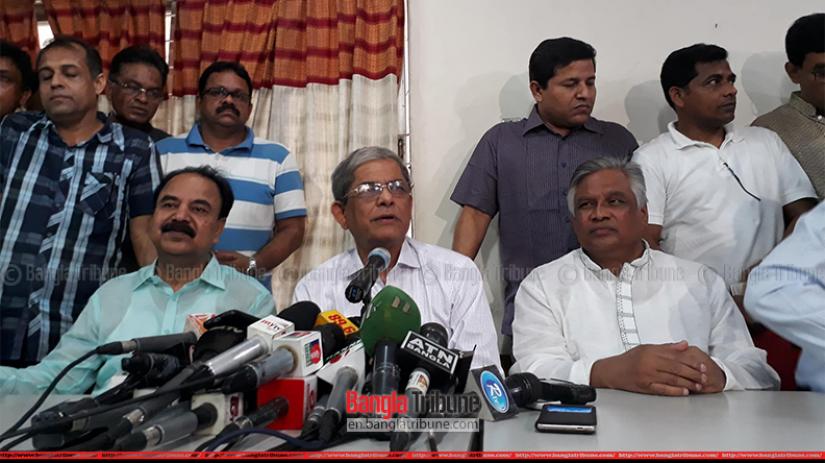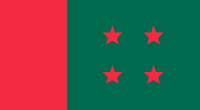 Following a massive defeat in the 11th parliamentary election, BNP’s Dhaka-based top policymakers have decided to refrain from taking proactive decisions until getting nods from acting party chief Tarique Rahman, who is in a self-imposed exile in London for a decade.
Following a massive defeat in the 11th parliamentary election, BNP’s Dhaka-based top policymakers have decided to refrain from taking proactive decisions until getting nods from acting party chief Tarique Rahman, who is in a self-imposed exile in London for a decade.
A number of central leaders, including those who sit in BNP’s policy-making National Standing Committee, said on condition of anonymity that they feel many wrong decisions were taken in the run-up to the Dec 30 polls.
They are thinking of banking on Tarique’s instructions for at least six months before raising opinions on how to move forward.
After the Dec 31 meeting of the BNP’s highest policymaking forum, a senior told Bangla Tribune that Tarique should now leave the party to them.
“We will take the party forward upon discussing within ourselves. His (Tarique’s) decisions limit the scope of work,” he said then.
Bangla Tribune reached out to at least 10 leaders of the BNP’s central and standing committees in the past few days since the Dec 30 election.
According to most of them, decisions like not disclosing their prime minister pick, hoping Khaleda’s prospect of contesting polls and nominating people linked with the infamous ‘Hawa Bhaban’ have hurt their chances in the election.
Political observers say the BNP must start anew rectifying the wrong choices made as part of their polls strategy. They have also suggested restructuring of the party’s front bodies and affiliated wings.
Although the issue came up in a standing committee meeting on Jan 16, no decisions were taken. The high ups in the party think it’s not yet time for holding council. Rather, they should stand beside party activists who are now behind bars and try to get them released.
“BNP is in proper order as an organisation. All state apparatus was used for getting the Awami League victorious. In an election where people were not allowed to vote, there’s nothing to blame the BNP,” Standing Committee member Jamiruddin Sircar told Bangla Tribune on Saturday.
“BNP does not resort to violence like the Awami League,” he said before adding, “BNP didn’t win as it was a lopsided election.”
According to the BNP leaders, there are basically three segments within the party — the grassroots, the organisational leadership, which is entirely under Tarique’s control and the political leadership, where the standing committee members play the key roles. It’s relevant to mention that five posts of the standing committee are still vacant.
Although the party activists blame the political leadership behind the polls debacle, the internal scenario is quite different. The standing committee members cannot take proactive decisions due to Tarique’s arbitrary decision making in all issues.
Although a five-member panel was formed ahead of the polls, it was Tarique, who called the shots from London on the party’s ticket for the election.
On choosing the prime minister, Oikya Front’s convenor Dr Kamal Hossain couldn’t take any decision on the matter either as the coalition’s biggest party didn’t have any.
Briefing Dhaka-based diplomats before the election, Kamal only said that the “the parliament will choose the prime minister should they win the election”.
Besides that, giving BNP tickets to at least two persons closely linked with ‘Hawa Bhaban’, was a “grave mistake”, according to a senior BNP leader, who said he thinks the move facilitated BNP “political defeat”.
The decision to pursue incarcerated party chief Khaleda Zia’s prospect of contesting polls has been deemed as lack of political farsightedness while the decision to allow Jamaat-e-Islami aspirants to contest with BNP’s polls logo is seen as the high command’s weakness.
At least six standing committee members, requesting to go unnamed, said that they will keep a close eye on Tarique’s decisions and behaviour before voicing their opinion.
Political observer Emajuddin Ahamed also thinks a number of last moment decisions, which BNP took before the election was unnecessary.
The central leaders didn’t entertain the idea of a party council at the moment. Rather, they say they should reshape the affiliate bodies of the party.
The Chatra Dal, the student wing of the party, has no committee for the last six years. Juba Dal President Saiful Arab Nirob didn’t take part in any polls campaign.
Jubo Dal Joint Secretary Asaduzzaman Asad said that a few thousands of BNP activists are not in jail, which undermined the party’s ability.
BNP’s Joint Secretary General Mahbub Uddin Khokon, however, thinks the party is rather strong in terms of organizational structure.
“BNP is organizationally very strong and a democratic party. That’s why when an unfair election is held with all the State mechanism in play, there is hardly anything the activists can do,” he said.
“Now we have to reorganize our affiliate wings. We have to reach the grassroots. We don’t need a council and have no demand for it either,” added Khokon.
Organizational Secretary Asadul Habib Dulu said, “BNP must get the activists, jailed before and after the polls, released first. Priority is to stand beside the families who lost their members, and we are doing precisely that.”
“We must free the party chief and garner public opinion against the farcical polls,” he emphasised.
Former Dhaka University VC Ahamed said, “The biggest problem is that Khaleda Zia is in jail. That’s the biggest problem. Besides, Tarique Rahman stays far from here. The long-distance conversations often create misunderstanding.”
“BNP must reorganize the party first before moving forward,” recommended Ahamed
According to unsupported sources, the government’s attitude towards Khaleda’s release will play a role in BNP’s decision on joining the parliament.
 Politics
Politics
31434 hour(s) 31 minute(s) ago ;
Afternoon 01:25 ; Saturday ; May 18, 2024
BNP leaders in Dhaka wait for London’s nod
Send
Salman Tareque Sakil and Aditto Rimon
Published : 04:00, Jan 22, 2019 | Updated : 04:00, Jan 22, 2019
Published : 04:00, Jan 22, 2019 | Updated : 04:00, Jan 22, 2019
0 ...0 ...
/tf/hm/zmi/
Topics: Top StoriesExclusive
- KOICA donates medical supplies to BSMMU
- 5 more flights to take back British nationals to London
- Covid19: Rajarbagh, Mohammadpur worst affected
- Momen joins UN solidarity song over COVID-19 combat
- Covid-19: OIC to hold special meeting
- WFP begins food distribution in Cox’s Bazar
- WFP begins food distribution in Cox’s Bazar
- 290 return home to Australia
- Third charter flight for US citizens to return home
- Dhaka proposes to postpone D8 Summit
Unauthorized use of news, image, information, etc published by Bangla Tribune is punishable by copyright law. Appropriate legal steps will be taken by the management against any person or body that infringes those laws.
Bangla Tribune is one of the most revered online newspapers in Bangladesh, due to its reputation of neutral coverage and incisive analysis.
F R Tower, 8/C Panthapath, Shukrabad, Dhaka-1207 | Phone: 58151324; 58151326, Fax: 58151329 | Mob: 01730794527, 01730794528


